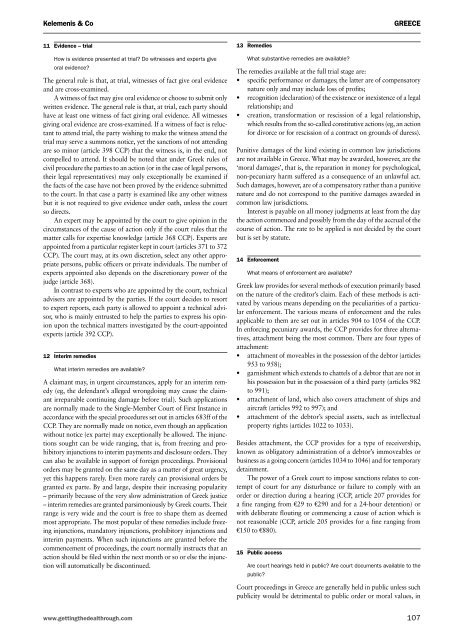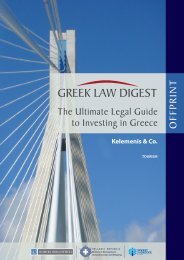Dispute Resolution - Kelemenis.com
Dispute Resolution - Kelemenis.com
Dispute Resolution - Kelemenis.com
You also want an ePaper? Increase the reach of your titles
YUMPU automatically turns print PDFs into web optimized ePapers that Google loves.
<strong>Kelemenis</strong> & Co<br />
greece<br />
11 Evidence – trial<br />
How is evidence presented at trial Do witnesses and experts give<br />
oral evidence<br />
The general rule is that, at trial, witnesses of fact give oral evidence<br />
and are cross-examined.<br />
A witness of fact may give oral evidence or choose to submit only<br />
written evidence. The general rule is that, at trial, each party should<br />
have at least one witness of fact giving oral evidence. All witnesses<br />
giving oral evidence are cross-examined. If a witness of fact is reluctant<br />
to attend trial, the party wishing to make the witness attend the<br />
trial may serve a summons notice, yet the sanctions of not attending<br />
are so minor (article 398 CCP) that the witness is, in the end, not<br />
<strong>com</strong>pelled to attend. It should be noted that under Greek rules of<br />
civil procedure the parties to an action (or in the case of legal persons,<br />
their legal representatives) may only exceptionally be examined if<br />
the facts of the case have not been proved by the evidence submitted<br />
to the court. In that case a party is examined like any other witness<br />
but it is not required to give evidence under oath, unless the court<br />
so directs.<br />
An expert may be appointed by the court to give opinion in the<br />
circumstances of the cause of action only if the court rules that the<br />
matter calls for expertise knowledge (article 368 CCP). Experts are<br />
appointed from a particular register kept in court (articles 371 to 372<br />
CCP). The court may, at its own discretion, select any other appropriate<br />
persons, public officers or private individuals. The number of<br />
experts appointed also depends on the discretionary power of the<br />
judge (article 368).<br />
In contrast to experts who are appointed by the court, technical<br />
advisers are appointed by the parties. If the court decides to resort<br />
to expert reports, each party is allowed to appoint a technical advisor,<br />
who is mainly entrusted to help the parties to express his opinion<br />
upon the technical matters investigated by the court-appointed<br />
experts (article 392 CCP).<br />
12 Interim remedies<br />
What interim remedies are available<br />
A claimant may, in urgent circumstances, apply for an interim remedy<br />
(eg, the defendant’s alleged wrongdoing may cause the claimant<br />
irreparable continuing damage before trial). Such applications<br />
are normally made to the Single-Member Court of First Instance in<br />
accordance with the special procedures set out in articles 683ff of the<br />
CCP. They are normally made on notice, even though an application<br />
without notice (ex parte) may exceptionally be allowed. The injunctions<br />
sought can be wide ranging, that is, from freezing and prohibitory<br />
injunctions to interim payments and disclosure orders. They<br />
can also be available in support of foreign proceedings. Provisional<br />
orders may be granted on the same day as a matter of great urgency,<br />
yet this happens rarely. Even more rarely can provisional orders be<br />
granted ex parte. By and large, despite their increasing popularity<br />
– primarily because of the very slow administration of Greek justice<br />
– interim remedies are granted parsimoniously by Greek courts. Their<br />
range is very wide and the court is free to shape them as deemed<br />
most appropriate. The most popular of these remedies include freezing<br />
injunctions, mandatory injunctions, prohibitory injunctions and<br />
interim payments. When such injunctions are granted before the<br />
<strong>com</strong>mencement of proceedings, the court normally instructs that an<br />
action should be filed within the next month or so or else the injunction<br />
will automatically be discontinued.<br />
13 Remedies<br />
What substantive remedies are available<br />
The remedies available at the full trial stage are:<br />
• specific performance or damages; the latter are of <strong>com</strong>pensatory<br />
nature only and may include loss of profits;<br />
• recognition (declaration) of the existence or inexistence of a legal<br />
relationship; and<br />
• creation, transformation or rescission of a legal relationship,<br />
which results from the so-called constitutive actions (eg, an action<br />
for divorce or for rescission of a contract on grounds of duress).<br />
Punitive damages of the kind existing in <strong>com</strong>mon law jurisdictions<br />
are not available in Greece. What may be awarded, however, are the<br />
‘moral damages’, that is, the reparation in money for psychological,<br />
non-pecuniary harm suffered as a consequence of an unlawful act.<br />
Such damages, however, are of a <strong>com</strong>pensatory rather than a punitive<br />
nature and do not correspond to the punitive damages awarded in<br />
<strong>com</strong>mon law jurisdictions.<br />
Interest is payable on all money judgments at least from the day<br />
the action <strong>com</strong>menced and possibly from the day of the accrual of the<br />
course of action. The rate to be applied is not decided by the court<br />
but is set by statute.<br />
14 Enforcement<br />
What means of enforcement are available<br />
Greek law provides for several methods of execution primarily based<br />
on the nature of the creditor’s claim. Each of these methods is activated<br />
by various means depending on the peculiarities of a particular<br />
enforcement. The various means of enforcement and the rules<br />
applicable to them are set out in articles 904 to 1054 of the CCP.<br />
In enforcing pecuniary awards, the CCP provides for three alternatives,<br />
attachment being the most <strong>com</strong>mon. There are four types of<br />
attachment:<br />
• attachment of moveables in the possession of the debtor (articles<br />
953 to 958);<br />
• garnishment which extends to chattels of a debtor that are not in<br />
his possession but in the possession of a third party (articles 982<br />
to 991);<br />
• attachment of land, which also covers attachment of ships and<br />
aircraft (articles 992 to 997); and<br />
• attachment of the debtor’s special assets, such as intellectual<br />
property rights (articles 1022 to 1033).<br />
Besides attachment, the CCP provides for a type of receivership,<br />
known as obligatory administration of a debtor’s immoveables or<br />
business as a going concern (articles 1034 to 1046) and for temporary<br />
detainment.<br />
The power of a Greek court to impose sanctions relates to contempt<br />
of court for any disturbance or failure to <strong>com</strong>ply with an<br />
order or direction during a hearing (CCP, article 207 provides for<br />
a fine ranging from e29 to e290 and for a 24-hour detention) or<br />
with deliberate flouting or <strong>com</strong>mencing a cause of action which is<br />
not reasonable (CCP, article 205 provides for a fine ranging from<br />
e150 to e880).<br />
15 Public access<br />
Are court hearings held in public Are court documents available to the<br />
public<br />
Court proceedings in Greece are generally held in public unless such<br />
publicity would be detrimental to public order or moral values, in<br />
www.gettingthedealthrough.<strong>com</strong> 107





